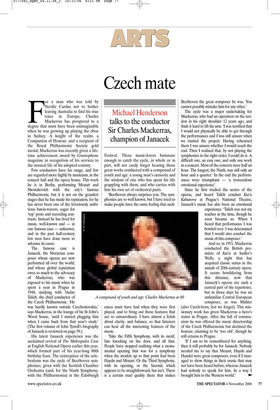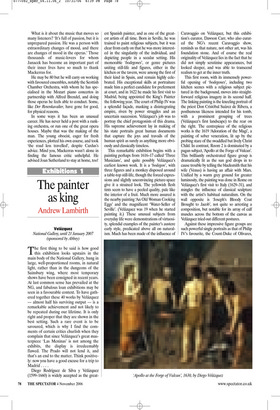Czech mate
Michael Henderson talks to the conductor Sir Charles Mackerras, champion of Janacek
For a man who was told by Neville Cardus not to bother leaving Australia to find his true voice in Europe, Charles Mackerras has prospered to a degree that must have been unimaginable when he was growing up playing the oboe in Sydney. A knight of the realm, a Companion of Honour, and a recipient of the Royal Philharmonic Society gold medal, Mackerras was recently given a lifetime achievement award by Gramophone magazine in recognition of his services to the musical life of his adopted country.
Few conductors have his range, and few are regarded more highly by musicians, in the concert hall and the opera house. This week he is in Berlin, performing Mozart and Shostakovich with the city’s famous Philharmonic, but it is not on the grandest stages that he has made his reputation, for he has never been one of the ferociously ambitious baton-wavers, eager for ‘top’ posts and recording contracts. Instead he has lived for music, well-known and — in one famous case — unknown, and in the past half-century few men have done more to advance its cause.
The famous case is Janacek, the Moravian composer whose operas are now performed all over the world, and whose global reputation owes so much to the advocacy of Mackerras, who was exposed to his music when he spent a year in Prague in 1948, studying with Vaclav Talich, the chief conductor of the Czech Philharmonic. ‘He was hardly known outside Czechoslovakia,’ says Mackerras, in the lounge of his St John’s Wood house, ‘until I started plugging him when I came back from that year’s study.’ (The first volume of John Tyrrell’s biography of Janacek is reviewed on page 59.) His latest Janacek experience was the acclaimed revival of The Makropulos Case at English National Opera earlier this year, which formed part of his year-long 80th birthday feast. The centrepiece of the celebrations was the cycle of Beethoven symphonies, given with the Scottish Chamber Orchestra (and, for the Ninth Symphony, with the Philharmonia) at the Edinburgh
© Z. Chrapek
Festival. Those music-lovers fortunate enough to catch the cycle, in whole or in part, will not easily forget hearing those great works conducted with a compound of youth and age: a young man’s curiosity and the wisdom of one who has spent his life grappling with them, and who carries with him his own set of orchestral parts.
‘Beethoven always surprises you. The symphonies are so well known, but I have tried to make people have the same feeling that audi ences must have had when they were first played, and to bring out those features that are so extraordinary. I have almost a fetish about clarity, and balance, so that listeners can hear all the interesting features of the music.
‘Take the Fifth Symphony, with its motif, fate knocking on the door, and all that. People have stopped realising what a monumental opening that was for a symphony when the models up to that point had been Haydn and Mozart. Or the Third Symphony, with its opening, or the Second, which appears to be straightforward, but isn’t. There is a certain mad quality there that makes Beethoven the great composer he was. You cannot possibly mistake him for any other.’ The cycle was a major undertaking for Mackerras, who had an operation on the tendon in his right shoulder 12 years ago, and finds it hard to lift his arm. ‘I was terrified that I would not physically be able to get through the performances and I was still unsure when we started the project. Having rehearsed them I was unsure whether I would reach the end. Then I realised that, by not playing the symphonies in the right order, I could do it. A difficult one, an easy one, and only one work in a concert. Most of the concerts were half an hour. The longest, the Ninth, was still only an hour and a quarter.’ In the end the performances were triumphant — ‘a tremendous emotional experience’.
Since he first studied the scores of the operas, and heard Talich conduct Kat’a Kabanova at Prague’s National Theatre, Janacek’s music has also been an emotional experience. ‘Talich was not my teacher at the time, though he soon became so. When I heard that performance I was bowled over. I was determined that I would also conduct the music of this composer.’ And so, in 1951, Mackerras conducted the British première of Kat’a at Sadler’s Wells, a night that has acquired classic status in the annals of 20th-century opera. It seems bewildering from this distance, now that Janacek’s operas are such a central part of the repertoire, but in those days he was an unfamiliar Central European composer, as was Mahler (also Czech-born, lest we forget). This missionary work has given Mackerras a hero’s status in Prague. After the fall of communism he was offered the music directorship of the Czech Philharmonic but declined the honour, claiming to be ‘too old’, though he still returns to Prague.
‘If I am to be remembered for anything, then it will probably be for Janacek. Nobody needed me to say that Mozart, Haydn and Handel were great composers, even if I managed to show things in their music that may not have been heard before, whereas Janacek had nobody to speak for him. In a way I brought him to the Western world.’ What is it about the music that moves so many listeners? ‘It’s full of passion, but it is unprepared passion. He was a person with extraordinary changes of mood, and there are changes of mood in the operas.’ Those thousands of music-lovers for whom Janacek has become an important part of their inner lives have so much to thank Mackerras for.
He may be 80 but he will carry on working with favoured ensembles, notably the Scottish Chamber Orchestra, with whom he has specialised in the Mozart piano concertos in partnership with Alfred Brendel, and doing those operas he feels able to conduct. Some, like Der Rosenkavalier, have gone for good, for physical reasons.
In some ways it has been an unusual career. He has never held a post with a ranking orchestra, or run one of the great opera houses. Maybe that was the making of the man. The young oboeist, eager for fresh experiences, plotted his own course, and took ‘the road less travelled’, despite Cardus’s advice. Mind you, Mackerras wasn’t alone in finding the famous critic unhelpful. He advised Joan Sutherland to stay at home, too!



















































































































 Previous page
Previous page